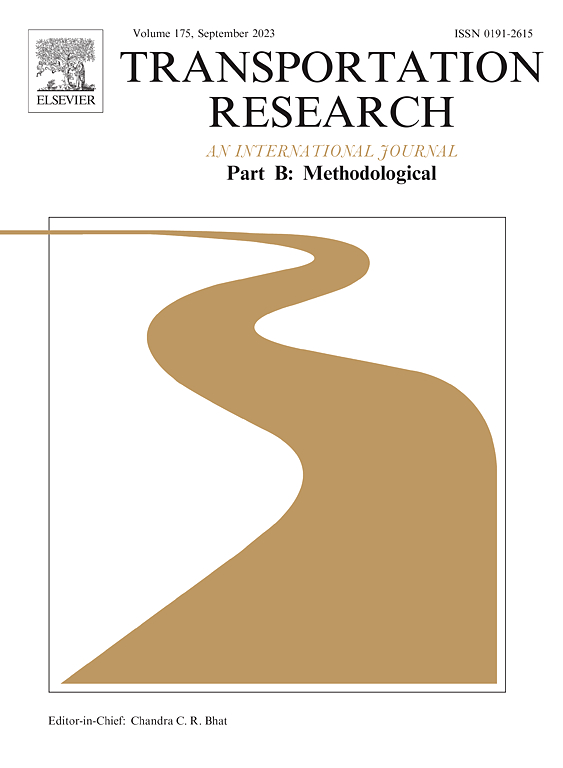Exact solution method for multi-stakeholder freight transportation systems under uncertainty
IF 6.3
1区 工程技术
Q1 ECONOMICS
引用次数: 0
Abstract
At a time where efficient freight logistics are crucial to global commerce, integrated multi-stakeholder freight transportation systems play a pivotal role in ensuring timely delivery and operational adaptability under uncertainty. This study focuses on the tactical planning of such a system, which processes time-sensitive requests from both carriers and shippers. It orchestrates operations spatially and temporally, combining loads from various shippers into unified transport units. Our approach utilizes a two-stage stochastic programming model that effectively captures the uncertainties inherent in demand. The model formulates an efficient service network that not only meets the immediate logistical demands but also adapts to fluctuating conditions by leveraging available service capacities. To solve this complex model, we develop and implement an exact Benders decomposition-based algorithm. Our solution methodology incorporates several advanced techniques including partial decomposition, cut-lifting for both optimality and feasibility cuts, and various preprocessing steps including variable fixing and the use of valid inequalities. Additionally, we implement acceleration techniques that capitalize on the repetitive nature of our algorithm to enhance efficiency. We design and generate test instances inspired by real-world freight logistics, capturing key operational constraints and varying demand uncertainty levels. These instances enable a systematic evaluation of our model under diverse settings. We then perform extensive computational experiments. Our solution methodology demonstrates superior performance compared to a commercial solver. We also explore the impact of varying service availability among other parameters and the benefits of using stochastic modeling over deterministic approaches. These experiments underscore our model’s capacity to improve operational efficacy and responsiveness when dealing with uncertainty, thereby providing significant insights for both practitioners and researchers involved in freight logistics.
不确定条件下多利益相关者货运系统的精确解方法
在高效的货运物流对全球商业至关重要的时代,综合的多利益相关者货运系统在确保及时交付和不确定性下的运营适应性方面发挥着关键作用。本研究的重点是这样一个系统的战术规划,该系统处理来自承运人和托运人的时间敏感请求。它在空间和时间上协调操作,将来自不同托运人的货物组合成统一的运输单元。我们的方法利用了一个两阶段的随机规划模型,有效地捕获了需求中固有的不确定性。该模型制定了一个高效的服务网络,不仅满足即时的后勤需求,而且通过利用现有的服务能力来适应波动的条件。为了解决这个复杂的模型,我们开发并实现了一个精确的基于Benders分解的算法。我们的解决方法结合了几种先进的技术,包括部分分解,最优性和可行性切割的切割提升,以及各种预处理步骤,包括变量固定和有效不等式的使用。此外,我们实现了加速技术,利用我们算法的重复特性来提高效率。我们设计和生成受现实世界货运物流启发的测试实例,捕捉关键的操作约束和不同的需求不确定性水平。这些实例能够在不同的设置下对我们的模型进行系统的评估。然后我们进行了大量的计算实验。与商业求解器相比,我们的求解方法表现出优越的性能。我们还探讨了不同服务可用性对其他参数的影响,以及使用随机建模优于确定性方法的好处。这些实验强调了我们的模型在处理不确定性时提高操作效率和响应能力的能力,从而为涉及货运物流的从业者和研究人员提供了重要的见解。
本文章由计算机程序翻译,如有差异,请以英文原文为准。
求助全文
约1分钟内获得全文
求助全文
来源期刊
CiteScore
12.40
自引率
8.80%
发文量
143
审稿时长
14.1 weeks
期刊介绍:
Transportation Research: Part B publishes papers on all methodological aspects of the subject, particularly those that require mathematical analysis. The general theme of the journal is the development and solution of problems that are adequately motivated to deal with important aspects of the design and/or analysis of transportation systems. Areas covered include: traffic flow; design and analysis of transportation networks; control and scheduling; optimization; queuing theory; logistics; supply chains; development and application of statistical, econometric and mathematical models to address transportation problems; cost models; pricing and/or investment; traveler or shipper behavior; cost-benefit methodologies.

 求助内容:
求助内容: 应助结果提醒方式:
应助结果提醒方式:


